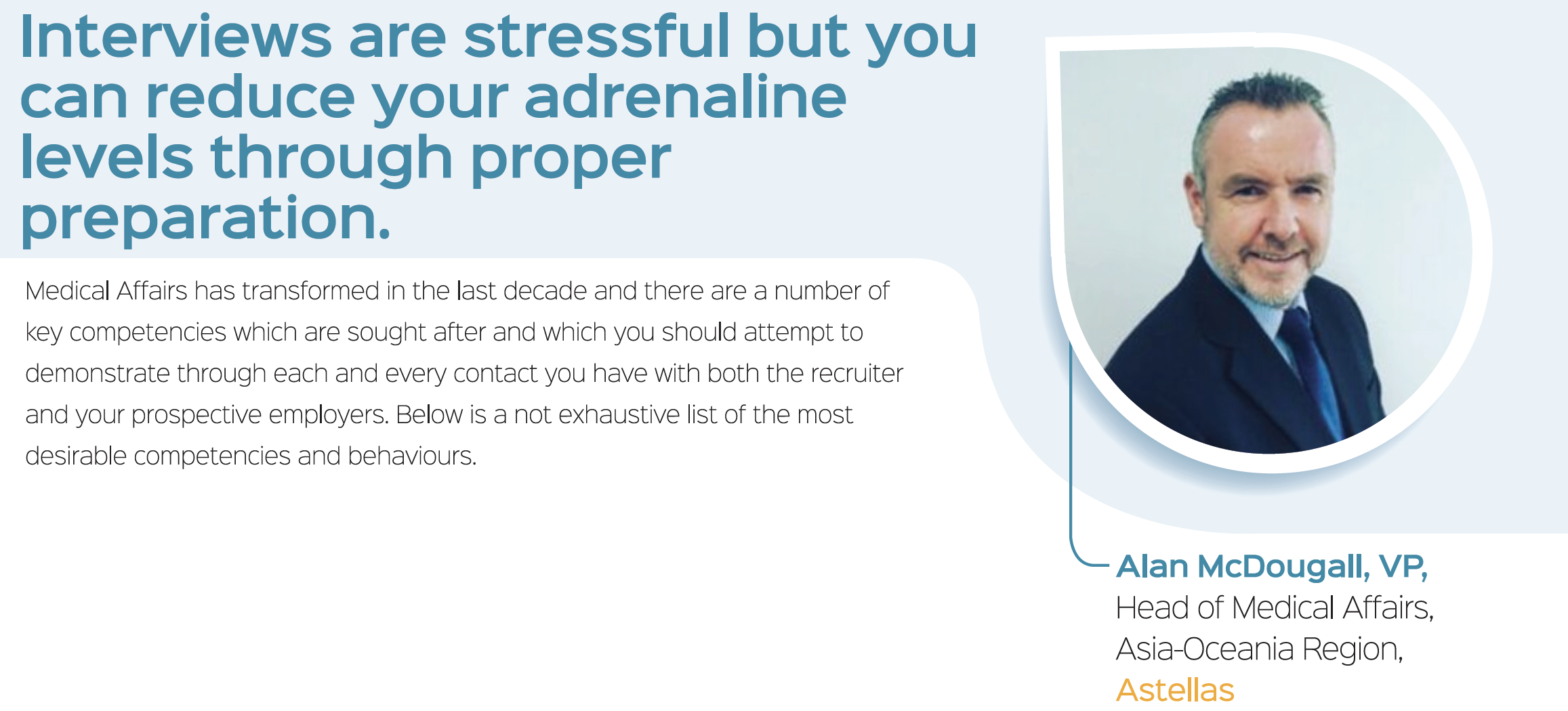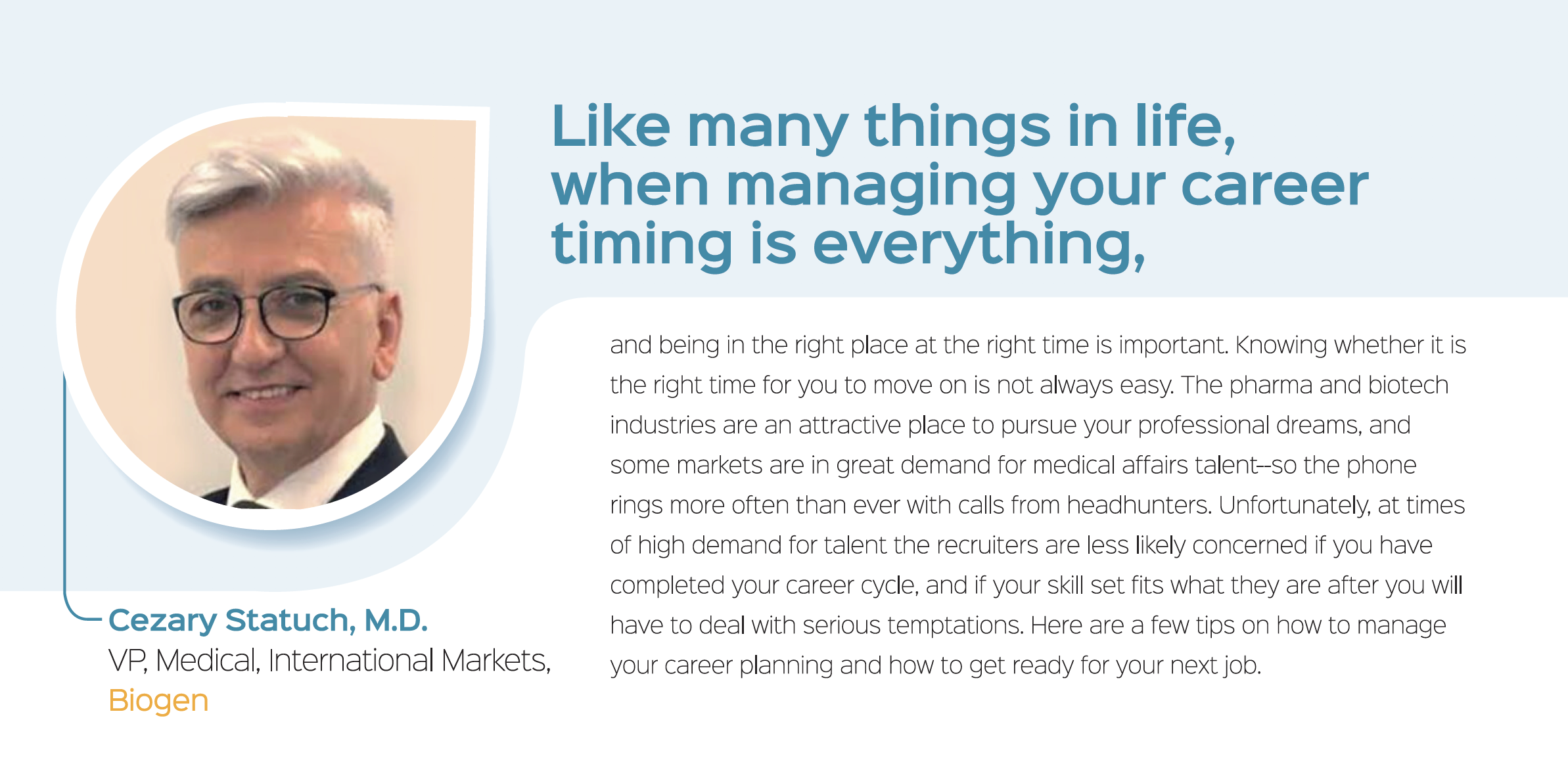Partnering With Patients In Asia Pacific
This MAPS podcast introduces listeners to social listening to gather insights and discusses implementation, value and technologies.
This MAPS podcast introduces listeners to social listening to gather insights and discusses implementation, value and technologies.
This webinar from the MAPS APAC region shares best practices for effectively leveraging patient insights to inform decision making.
By Alan McDougall, MD, VP, Head of Medical Affairs, Asia-Oceania Region, Astellas

Interviews are stressful but you can reduce your adrenaline levels through proper preparation. Medical Affairs has transformed in the last decade and there are a number of key competencies which are sought after and which you should attempt to demonstrate through each and every contact you have with both the recruiter and your prospective employers. Below is a not exhaustive list of the most desirable competencies and behaviours.
Communication
The ability to communicate clearly and effectively and through a variety of channels is essential for anyone working in medical affairs. Having a high level of knowledge but an inability to share it or teach it effectively is of little value. Communication also includes using appropriate body language, listening skills and the ability to provide feedback. Make sure every verbal or written contact you have with the company or the recruiter is carefully thought through and proof-read in the case of written contacts.
Passion and enthusiasm
Employers want to hire someone who demonstrates a passion to work at their company, sometimes described as being “hungry” for the role. Having the right attitude is often more important than knowledge, because attitude is very hard to train but knowledge can be learned. Carefully word your cover letter and individualise your CV for each job to stress key experiences or skills that are mentioned in the advertisement and job description (JD). Spend time browsing through the company’s corporate website and come armed with pre-prepared questions which are thoughtful and specific to the role and the company. If possible, ask about a recent company press release and the implications (if any) for the role for which you are applying.
Technical skills
Medical affairs positions require certain technical skills that are usually listed in the job advertisement or JD. You should already possess many of the skills the company is looking for, at least to some degree. You may not yet be an expert in all of them but there should be a solid foundation upon which you can build. Typically, at interview, these technical competencies will be assessed (presentation skills, therapeutic area knowledge etc.). Take note of the JD, advert and recruiter’s comments and use every contact opportunity to mention where your current technical skills fit the role being offered.
Work ethic
It should go without saying that employers expect you to be at work on time, do what you were hired to do, meet targets and deadlines and work to the best of your ability. Sadly, we have all worked with colleagues who do not always meet these basic requirements. Make sure you are early for interviews, meet all deadlines when replying to emails, phone messages etc. and do everything you can to give your prospective manager confidence in your own work ethic. You have only a few contact opportunities with your potential next company and so make sure each one says something positive about you and your personal standards.
Flexibility
More than ever before, employees need to react quickly to changing business conditions. Agile companies and agile teams are currently popular subjects in articles written by business thought leaders. Employers need employees who can quickly adapt to change. Come to interview with examples of how you demonstrated your own agility – perhaps covering another role on top of your own, taking on a project about which you had no little or no previous experience and delivering a successful outcome or dealing positively with an unpredictable environmental change.
Resilience
We all typically get challenging but (hopefully) achievable goals and deadlines. The key to successful delivery is often being able to work hard and to keep moving forward when you encounter the inevitable and frustrating obstacles that regularly happen in business. Come to interview with examples of how you overcame particularly difficult challenges and show that you did not give up but that you persevered and ultimately met your objectives.
Teamwork
Little in the pharmaceutical industry is achieved by a single individual. Roles in medical affairs are becoming more diverse and specialised and therefore there is an increasing need for reliance on your colleagues to get things done. The ability to get on and work collaboratively with others is therefore a key competency. Using real examples, show how you contributed to successful teamwork under challenging circumstances and how you “did not give up”.
Life-long learner
As product portfolios and market environments change, there is a need to seek out new information, challenge your beliefs and explore new ways of doing things. Long-held “facts” can change when new contradictory evidence emerges. People who are naturally curious with an interest in learning combined with a willingness to share this with others, make great co-workers. At interview, explain what new skills or knowledge you have learned, how you applied this at work and describe the impact that it made.
Problem-solving skills
Managers look for people who are motivated to take on business challenges, ideally with minimal direction. Most of us prefer our employees to “come to us with solutions not problems”. Employees should see when something needs to be done and react accordingly. Come to interview with examples of how you observed an issue at work, took ownership of it and solved it. This can be even more impactful if it wasn’t in your job description in the first place.
Loyalty
Employers want people to stay with them for many years due to their financial investment with the recruitment company and the time spent on interviews and on your on-boarding process. Multiple job moves in a relatively short time period with different companies is usually an alarm bell and indicates a risk that you will not stay long if you are even offered the job. If you unfortunately have had several short-term moves recently, make sure that you come to interview with a clear explanation as to why and what you learned. Try hard not to criticise your current or previous companies or managers as this can come across quite negatively, even if you feel you have every right to do so. Employers always prefer someone running towards the role on offer than someone running away from their current job as the former is a positive choice whereas the latter can be simply escaping to “any port in a storm”.
Conclusion
It is a truism to say that you only have one chance to make a good first impression and so at interview be well prepared and make sure you have done your homework well in advance. Tell the employer why you really want this job and make sure your passion and enthusiasm come to the forefront. Show your agility, resilience and ability to learn, which are all highly valued competencies by employers. Finally, do remember that all contacts with the employer and recruiter, no matter how trivial, are likely to be judged so make them count!
By Cezary Statuch, MD, VP, Medical, International Markets, Biogen

Like many things in life, when managing your career timing is everything, and being in the right place at the right time is important. Knowing whether it is the right time for you to move on is not always easy. The pharma and biotech industries are an attractive place to pursue your professional dreams, and some markets are in great demand for medical affairs talent–so the phone rings more often than ever with calls from headhunters. Unfortunately, at times of high demand for talent the recruiters are less likely concerned if you have completed your career cycle, and if your skill set fits what they are after you will have to deal with serious temptations. Here are a few tips on how to manage your career planning and how to get ready for your next job.
602 Park Point Drive, Suite 225, Golden, CO 80401 – +1 303.495.2073
© 2025 Medical Affairs Professional Society (MAPS). All Rights Reserved Worldwide.
